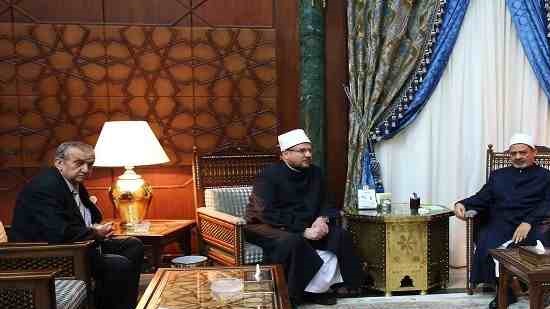Egypt's top Muslim clerics said Wednesday that an academy specialised in training preachers will be set up as part of the government's campaign against religious extremism, possibly paving the way for the revoking of recent controversial measures to standardise sermons at Friday prayers.
The decision to establish the new religious body followed a meeting between the Grand Imam of Al-Azhar, the highest seat of Sunni Islamic learning, and Minister of Endowments Mohamed Mokhtar Gomaa, along with other top clerics.
The meeting, where the officials discussed means of "renewing religious discourse" as repeatedly called for by President Abdel-Fattah El-Sisi, came on the same day when similar talks took place between El-Sisi and Grand Imam Ahmed El-Tayeb.
A recent decision by the Ministry of Religious Endowments requiring clerics to read identical, pre-prepared scripts on Friday sermons in a bid to crush radical ideas has been a source of discord between the ministry and Al-Azhar, two of the country's top religious bodies.
Al-Azhar, which under the Egyptian constitution is in charge of Dawaa (proselytising) and preaching, opposed the decision, arguing it would “freeze” the development of religious discourse and make the thinking of the religious clerics shallow.
Some scholars at Al-Azhar have said that the decision lies outside the jurisdiction of the endowments ministry, which is only responsible for administering mosques and Islamic centres.
Wednesday's meeting does, however, seem to have helped in reaching a middle ground.
The top scholars agreed to form an academy for Dawaa whose graduates would be the only clerics authorised to preach, serve as imams or issue edicts.
The new school will provide training to improve “competence” of clerics, officials say.
Mohy El-Din Afify, the head of Al-Azhar's Islamic Research Academy, who also attended Wednesday's meeting, suggested that following the latest talks the standardised sermons would not be obligatory.
"Al-Azhar's opinion is fundamental, yet not at the expense of that of the endowments [ministry] or Dar Al-Ifta [which issues religious edicts]," Afify said in TV comments on Thursday.
"Negotiations are now underway to reach an objective vision that suits those working in Dawaa and religious discourse," added.
The Ministry of Religious Endowments has since 2014 been setting topics for weekly sermons delivered during Friday prayers across the country, but the recent decision of mandating the preaching of identical sermons would further restrict preachers in Egypt's more than 100,000 mosques to read out the same text.
The recent moves come as part of the government's efforts to end the use of mosques as a platform for political groups and to clamp down on “extremist views,” which authorities say are being spread by preachers supporting the now-banned Muslim Brotherhood group and its ultraconservative allies.
El-Sisi has more than once blamed “outdated religious discourse” for holding back Egypt and called for reform, saying that radicalised thinking has become a source of destruction for the rest of the world.




